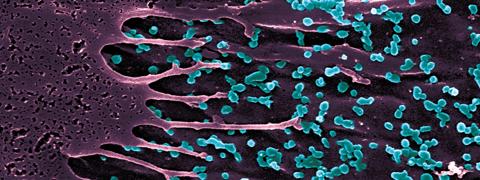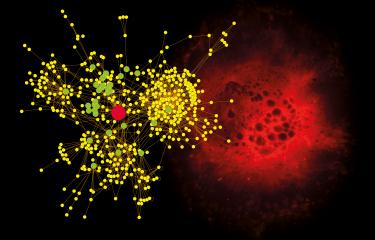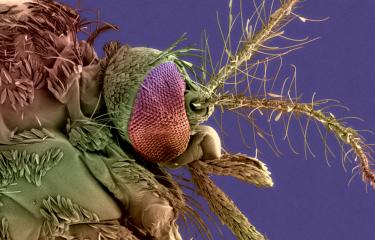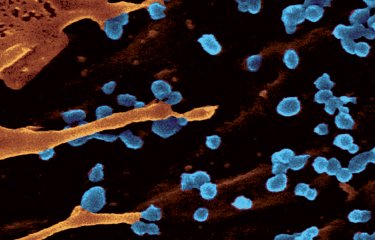Results presented at international conferences in Philadelphia and in New Orleans.
The induction of neutralizing antibodies by a prophylactic Chikungunya vaccine candidate has now been confirmed by the final results of a phase 1 clinical trial, as well as its tolerability and safety. Detailed information of the trial has been presented at two international conferences. The vaccine candidate was developed under a R&D collaboration between Themis Bioscience GmbH and the Institut Pasteur (Paris) based upon a measles vaccine vector technology. Following this positive trial outcome both parties agreed to broaden the scope of their collaboration.
Press release
Vienna, November 20, 2014

The Vienna-based biotech company Themis Bioscience GmbH (‘Themis’) today received final results of a phase 1 clinical study of its prophylactic Chikungunya fever vaccine. The study was carried out on 42 subjects at the Department of Clinical Pharmacology of the Vienna General Hospital (Allgemeines Krankenhaus der Stadt Wien) and confirms the previous interim results: the candidate not only proved to be well tolerated and safe, but also exhibited the required immune response in the form of neutralizing antibodies in all vaccinated subjects. Remarkably, the immune response was clearly dose-dependent with even the lowest dose being effective. Details on the clinical trial were recently presented at two international conferences, namely the 26–28 October "8th Vaccine & ISV Congress" in Philadelphia, USA and the 2–6 November "ASTMH 63rd Annual Meeting" in New Orleans, USA. Commenting on the success of this Chikungunya Phase I study, Themis founder and CEO, Dr. Erich Tauber, states: "We could confirm that our Chikungunya vaccine candidate is well tolerated, safe and elicits the expected immune response. Considering the ongoing spread of Chikungunya epidemic, we now focus on making the vaccine available as soon as possible. We will also strengthen our already successful alliance with the Institut Pasteur."
Highly promising platform with production advantage
The now confirmed success of the trial rests on the measles vector platform, which core technology has been developed at the Institut Pasteur in Paris using a standard commercialised measles vaccine as a vector. Genes coding for selected antigens from the Chikungunya virus have been inserted into the genome of the well-established measles vaccine delivering those new antigens into the cells, thereby triggering a specific immune response against the Chikungunya virus.
Such phase 1 achievement with the Chikungunya vaccine candidate further validates this core technology, clinically and regulatory-wise, gearing it as well towards large scale, low cost production – a significant advantage for the development of vaccines against epidemic infectious diseases.
Themis and the Institut Pasteur will extend their collaboration towards a common goal of developing vaccines against numerous infectious diseases based on that promising vector. The long standing excellence of the world renowned Institut Pasteur in research, diagnosis and prevention of infectious diseases stands out as a welcome contribution to this process. The pipeline already includes a dengue fever vaccine candidate, and the two partners will now collaborate on using Themaxyn® for additional targets. Frederic Tangy, Institut Pasteur, states: "The phase I results of the Chikungunya vaccine candidate prove that the measles vector vaccine platform can be used successfully to develop a new generation of prophylactic vaccines, and the Institut Pasteur, which developed its core technology is keen to strengthen its alliance with Themis to develop those innovative vaccine candidates”.
Themis mission
Dr. Erich Tauber adds: "Themis’ expertise rests in translating into the clinic the programs based on the measles vector platform, in a variety of indications. Once the clinical proof of concept has been established, the rights to license, manufacture and market any of the company's vaccines will be signed with third parties. Therefore, the strengthening of the alliance with the Institut Pasteur in applying the Themaxyn® platform to new indications offer an ideal fit for Themis' business model. We are grateful to the Institut Pasteur for such confidence and continued successful collaboration".
Illustration: Chikungunya virus particles on the surface of an infected cell © Institut Pasteur/Thérèse Couderc
About Themis:
Themis Bioscience GmbH develops prophylactic vaccines from the preclinical to the early clinical phase, focusing on emerging tropical infectious diseases, with initial vaccine candidates currently being developed against Chikungunya and Dengue. The company's highly innovative and fully patent-protected measles virus vaccine vector technology platform, licensed from the internationally respected Institut Pasteur in Paris, forms the basis for all current vaccine candidates of the Vienna-based company.
About Institut Pasteur:
Louis Pasteur created the Institut Pasteur in 1887 as a private non-profit foundation that rapidly became world-renowned for its biomedical research. The main aim of the Institut Pasteur is understanding and preventing diseases throughout the world through excellent scientific and public health research, teaching and other activities. Together with its major contribution to a deeper understanding of fundamental aspects of life, the Institut Pasteur continues to devote a large part of its efforts to infectious diseases, inherited disorders, neurodegenerative diseases and certain cancers. Close to 2,400 people work on its main campus in Paris, which is at the heart of an international network of 32 research institutes on 5 continents. Over the years, 10 Institut Pasteur researchers have received the Nobel Prize.
About Chikungunya virus:
Chikungunya is a mosquito-borne viral disease causing symptoms such as fever, joint pain, muscle pain, headache and nose and gum bleeding. Chikungunya is present in parts of Africa, Southeast Asia, the Americas and on the Indian subcontinent. The first transmission within continental Europe was reported from north-eastern Italy in August 2007. Every year, imported cases among tourists are identified in several European countries. Since late 2013, the first large outbreak of Chikungunya has been identified in the Americas, with more than 780,000 reported cases to date for this single epidemic.





